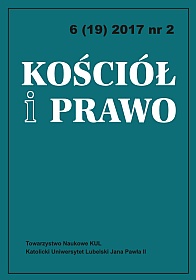The Legal Basis of Responsibility of the Christian Faithful for the Material Needs of the Church
Abstract
The duty safeguard of the material needs of the Church is precisely related to the possibility of executing purposes by him, which are: celebrating of the divine worship, exercising works of the sacred apostolate and of charity and decent sustenance of the ministers. The legal basis of responsibility of the Christian faithful in this regard are regulations of the 1983 Code of Canon Law. The legislator reminds an innate right of Church (ius nativum) to require from the Christian faithful those things which are necessary for the purposes proper to it (can. 1260) and at the same time obliges all the faithful to care for material means for realization this purposes (can. 222 § 1). In the analyzed area the sources indicated by the Pontifical Commission for the Authentic Interpretation of the Code of Canon Law are also relevant, especially: can. 1496 of the 1917 Code of Canon Law, decrees of the Second Vatican Council: Apostolicam actuositatem, Ad gentes divinitus, Presbyterorum ordinis. The source documents referred to the first codification of canon law should be also recognized as legal basis.
References
Bączkowicz, Franciszek, Józef Baron, i Władysław Stawinoga. 1958. Prawo kanoniczne. Podręcznik dla duchowieństwa. T. 2. Wyd. 3. Opole: Wydawnictwo Diecezjalne św. Krzyża w Opolu.
Central Office of the Church Statistics of the Secretariat of State, ed. 2017. Annuarium Statisticum Ecclesiae 2015. https://press.vatican.va/content/salastampa/en/bollettino/pubblico/2017/04/06/170406e.html [dostęp: 2.12.2017].
Gasparri, Pietro. 1933. Catechismus catholicus. Ed. 10. Roma: Typis Polyglottis Vaticanis.
Gasparri, Pietro. 2015. Katechizm katolicki. Warszawa: Wydawnictwo Prohibita Paweł Toboła–Pertkiewicz.
Global Christianity. A Report on the Size and Distribution of the World’s Christian Population. 2011. Washington, D.C.: Pew Research Center.
He, Wan, Daniel Goodkind, and Paul Kowal, U.S. Census Bureau, International Population Reports, P95/16-1. 2016. An Aging World: 2015. Washington, DC: U.S. Government Publishing Office.
Jougan, Alojzy. 1958. Słownik kościelny łacińsko-polski. Wyd. 3. Poznań–Warszawa–Lublin: Księgarnia św. Wojciecha.
Korpanty, Józef, red. 2001. Słownik łacińsko-polski. T. 1. Warszawa: Wydawnictwo Szkolne PWN.
Krukowski, Józef. 2005. „Obowiązki i uprawnienia wszystkich wiernych chrześcijan.” W Komentarz do Kodeksu Prawa Kanonicznego. T. II/1: Księga II. Lud Boży. Część I. Wierni chrześcijanie. Część II. Ustrój hierarchiczny Kościoła, red. Józef Krukowski, 22-42. Poznań: Pallottinum.
Pasternak, Ferdynand. 1970. Urzędy i beneficja kościelne. Majątek kościelny. Warszawa: Akademia Teologii Katolickiej.
Plezia, Marian, red. 2007. Słownik łacińsko-polski. T. 2. Wyd. 2 reprint. Warszawa: Wydawnictwo Naukowe PWN.
Sitarz, Mirosław. 2004. Słownik prawa kanonicznego. Warszawa: Instytut Wydawniczy Pax.
Słowikowska, Anna. 2017. „Podstawy odpowiedzialności wiernych za materialne potrzeby Kościoła.” Teka Komisji Prawniczej. Polska Akademia Nauk Oddział w Lublinie 10:215-34.
Sondel, Janusz. 2009. Słownik łacińsko-polski dla prawników i historyków. Kraków: Towarzystwo Autorów i Wydawców Prac Naukowych Universitas.
Copyright (c) 2017 Kościół i Prawo

This work is licensed under a Creative Commons Attribution-NonCommercial-NoDerivatives 4.0 International License.





